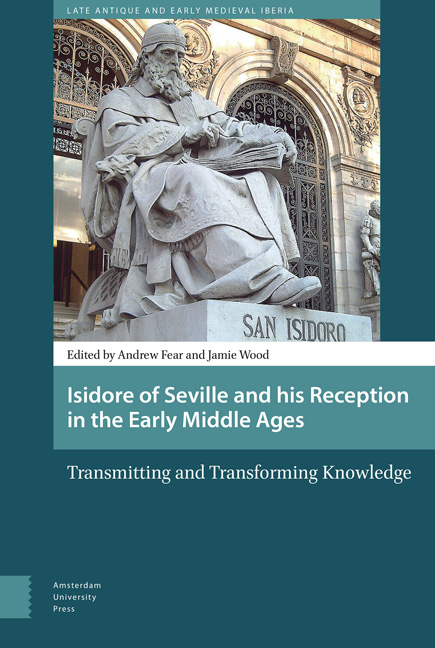 Isidore of Seville and his Reception in the Early Middle Ages
Isidore of Seville and his Reception in the Early Middle Ages Book contents
- Frontmatter
- Contents
- Preface: Paul Fouracre, University of Manchester
- 1 Introduction
- 2 A Family Affair: Leander, Isidore and the Legacy of Gregory the Great in Spain
- 3 Variations on a Theme: Isidore and Pliny on Human and Human-Instigated Anomaly
- 4 Putting the Pieces Back Together: Isidore and De Natura Rerum
- 5 The Politics of History-Writing: Problematizing the Historiographical Origins of Isidore of Seville in Early Medieval Hispania
- 6 Isidorian Texts in Seventh-Century Ireland
- 7 Isidore of Seville in Anglo-Saxon England: The Synonyma as a Source of Felix’s Vita S. Guthlaci
- 8 Hispania et Italia: Paul the Deacon, Isidore, and the Lombards
- 9 Rylands MS Latin 12: A Carolingian Example of Isidore’s Reception into the Patristic Canon
- 10 Adoption, Adaptation, & Authority: The Use of Isidore in the Opus Caroli
- Abbreviations
- Index
Preface: Paul Fouracre, University of Manchester
Published online by Cambridge University Press: 12 December 2020
- Frontmatter
- Contents
- Preface: Paul Fouracre, University of Manchester
- 1 Introduction
- 2 A Family Affair: Leander, Isidore and the Legacy of Gregory the Great in Spain
- 3 Variations on a Theme: Isidore and Pliny on Human and Human-Instigated Anomaly
- 4 Putting the Pieces Back Together: Isidore and De Natura Rerum
- 5 The Politics of History-Writing: Problematizing the Historiographical Origins of Isidore of Seville in Early Medieval Hispania
- 6 Isidorian Texts in Seventh-Century Ireland
- 7 Isidore of Seville in Anglo-Saxon England: The Synonyma as a Source of Felix’s Vita S. Guthlaci
- 8 Hispania et Italia: Paul the Deacon, Isidore, and the Lombards
- 9 Rylands MS Latin 12: A Carolingian Example of Isidore’s Reception into the Patristic Canon
- 10 Adoption, Adaptation, & Authority: The Use of Isidore in the Opus Caroli
- Abbreviations
- Index
Summary
‘God's anger was shown so clearly that a star appeared in the heavens – the star astrologers call a comet: when it rises, they say, the earth is convulsed with hunger, with the swift succession of kings, with the movement of peoples, and the clashing of swords threatens it’. These are the words of a Frankish hagiographer writing probably in the early 680s. He (we can be almost certain that it was a ‘he’) was describing the interregnum of 675/6 which led to the death of his hero, Leudegar, bishop of Autun. The passage just quoted came from Isidore's Etymologies (3.71.16). For an author who rarely moves beyond the scriptural in his borrowings, it is remarkable to see him turning to Isidore in this way. The borrowing is testimony both to the rapid dissemination of Isidore's works across Western Europe and to their importance as tools for explaining human vicissitudes in a turbulent world.
Several of the chapters in this volume derive from a day workshop that was held at the Instituto Cervantes in Manchester in April 2013. The aim in putting together the volume was to combine these pieces with some specially-commissioned studies in order to create the first English-language collected volume on Isidore. Drawing on the strong scholarly tradition in the study of Isidore in France and Spain, as well as the increasing number of new editions of key Isidorian texts, the volume incorporates original contributions from established and early career scholars that provide a chronologically and geographically coherent overview of Isidore's impact across Western Europe in the early medieval period, from Spain, Ireland, England, Italy and Francia.
The debt Western European learning of the Early Middle Ages owed to Isidore as a transmitter and translator of the classical tradition is more or less a given in narratives of intellectual history. A collection of essays that clarifies, highlights nuances and further explains his contribution is therefore most welcome. It is particularly useful to juxtapose the Iberian context of Isidore's work with its reception in other cultures: the collection demonstrates, as the editors put it, ‘that there was not one Isidorian legacy but many’. And as Christopher Heath's chapter suggests, we can identify that legacy in works which do not actually quote him.
- Type
- Chapter
- Information
- Isidore of Seville and his Reception in the Early Middle AgesTransmitting and Transforming Knowledge, pp. 7 - 10Publisher: Amsterdam University PressPrint publication year: 2016
